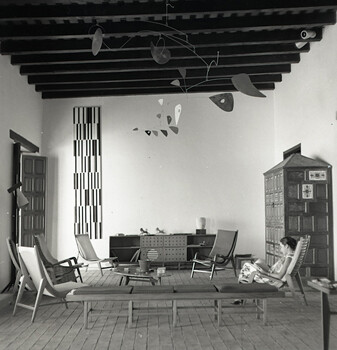February 12–May 16, 2015
Opening: Wednesday, February 11, 7pm
Americas Society
680 Park Avenue
New York, NY 10065
Hours: Wednesday–Saturday
noon–6pm
Symposium: “The Invention of the Modern Domestic Space in Latin America: Design, Art, and Architecture”
Thursday, February 12, 11am–6pm
Hunter College
695 Park Avenue, North Building
Room 1527, 15th Floor
New York, NY 10065
The Americas Society presents the exhibition Moderno: Design for Living in Mexico, Brazil, and Venezuela, 1940–1978. Among Latin American audiences, the word moderno (modern) has been linked to ideas of novelty and accelerated development, rather than a particular style or art movement. In the world of design, the term moderno was ubiquitous during the postwar period, a customary label to advertise new things. To be moderno was exciting and fashionable for the educated middles classes and wealthy elites, as well as aspirational for the lower strata, but, more than anything, it conveyed a promise of the future inspired by nationalistic goals, with which some Latin American countries aimed to achieve progress through the construction of industrialized autonomous societies.
Design, a relatively new professional discipline in the region, gained traction and became a key to achieving industrialization plans. As the Cuban-born Mexican designer Clara Porset stated in 1952, “Design is everything, whether natural or created by man,” and local manufacturers sensed the need for designers to create and develop new products and services compatible with local tastes and customs in addition to international standards. Large-scale infrastructure developments that took place throughout North and South America in the 1940s, 1950s, and 1960s were preceded by small-scale design experimentation initiatives in the domestic space.
This exhibition explores the aesthetic legacy, utopian ambitions, and internal contradictions that reveal three different instances on how Latin American developmentalist agendas were linked to design in order to forge modern national identities. The Italian-born Brazilian architect and designer Lina Bo Bardi summarized that operation as an “attempt to make industrial design the regenerative force of an entire society,” which, according to her, failed to integrate all the sectors in the narrative of progress. The focus of this exhibition is to examine the contribution of Latin American designers to the different processes and moments of modernization by creating local aesthetic idioms or adapting and interpreting international design trends to the mutating and complex realities of their own national contexts.
Guest curated by Maria Cecilia Loschiavo dos Santos, Ana Elena Mallet, and Jorge Rivas, Moderno is accompanied by a fully illustrated hardcover catalogue co-published by the Americas Society and PRISA/Santillana USA, a one-day international symposium, and curator-led tours throughout the show’s duration. Prestigious scholars in the fields of design and architecture will present at the symposium organized by the Americas Society and titled “The Invention of the Modern Domestic Space in Latin America: Design, Art, and Architecture.” Modern Latin American design will be situated in a global context, in which the role of domestic space as a place to project new aesthetic ideas that made visible the emergence of a professional class with democratic aspirations will be examined. The symposium will also discuss relatively unknown case studies of local firms and independent designers active between the 1940s and 1970s in Brazil, Mexico and Venezuela, which sought to use design as an educational tool as well as a utopian platform for social change. Symposium participants include Barry Bergdoll (Museum of Modern Art, New York), Luis M. Castañeda (Syracuse University, New York), Patricio del Real (Museum of Modern Art, New York), Pat Kirkham (Bard Graduate Center, New York), Zeuler R. Lima (Washington University, St. Louis), Jill Magid (artist), Rodrigo Queiroz (Universidade de São Paulo, Brazil), Gabriela Rangel (Americas Society, New York), and the exhibition curators.
Moderno will travel to the Blanton Museum of Art in Austin, Texas, from October 11, 2015 through January 17, 2016.
The exhibition and public programs form Moderno: Design for Living in Brazil, Mexico, and Venezuela, 1940–1978 are made possible by the generous support of PRISA/Santillana USA; Mercantil; the Ministry of Foreign Affairs/Mexican Agency for International Development Cooperation (SRE/AMEXCID), The National Council for Culture and the Arts (CONACULTA), the National Institute of Fine Arts (INBA) and the Mexican Cultural Institute of New York; Jaime and Raquel Gilinski; Mex-Am Cultural Foundation; Grupo DIARQ; Furthermore: a program of the J. M. Kaplan Fund; Colección Patricia Phelps de Cisneros; and Hotel Americano.
The exhibition is also supported, in part, by an award from the National Endowment for the Arts; the New York State Council on the Arts with the support of Governor Andrew Cuomo and the New York State Legislature; and by public funds from the New York City Department of Cultural Affairs, in partnership with the City Council.




